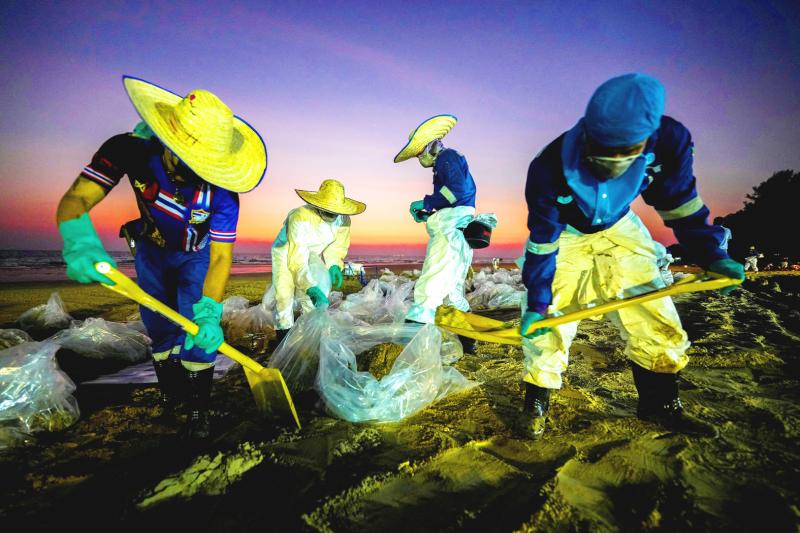The governor of a province in eastern Thailand on Saturday declared a state of emergency after an oil slick washed up on a sand beach, shutting down restaurants and shops in a setback for the COVID-19 pandemic-hit tourism industry.
About 20 to 50 tonnes of oil are estimated to have leaked in the Gulf of Thailand on Tuesday night. It came from an undersea hose used to load tankers at an offshore mooring point owned by Star Petroleum Refining.
The leak was stopped within hours, the company said, but efforts to keep an oil slick from reaching the Mae Ramphueng beach in Rayong Province southeast of Bangkok were unsuccessful, and some oil began spilling onto the sand there on Saturday morning.

Photo: Reuters
A major part of the slick remains at sea. There are concerns that it might hit Koh Samet, a popular tourist island that is just beginning to recover from the pandemic slump along with the rest of the country.
Aircraft have been dropping chemicals to disperse the oil and deploying floating booms to trap it so that it can be skimmed from the surface and removed.
Rayong Governor Channa Iamsaeng on Saturday declared the stricken beach a disaster area, and ordered it closed for swimmers and commercial activities.
About 200 Royal Thai Navy personnel and 150 people from Star Petroleum were helping in the cleanup with equipment to absorb and skim the oil, while two backhoes dug a trench to capture the incoming oil.
The beachside area is largely dependent on tourists. It has been suffering economically from the pandemic keeping visitors away, and the spill is likely to make recovery harder.
The local fishing industry was also affected by the pollution.
Greenpeace Thailand said the spill was the second involving Star Petroleum after an incident in 1997.
Greenpeace in a statement demanded that the oil company show clear accountability for the incident, pay for the cleanup and issue a complete report on the economic, social and environmental impacts of the spill.

PARLIAMENT CHAOS: Police forcibly removed Brazilian Deputy Glauber Braga after he called the legislation part of a ‘coup offensive’ and occupied the speaker’s chair Brazil’s lower house of Congress early yesterday approved a bill that could slash former Brazilian president Jair Bolsonaro’s prison sentence for plotting a coup, after efforts by a lawmaker to disrupt the proceedings sparked chaos in parliament. Bolsonaro has been serving a 27-year term since last month after his conviction for a scheme to stop Brazilian President Luiz Inacio Lula da Silva from taking office after the 2022 election. Lawmakers had been discussing a bill that would significantly reduce sentences for several crimes, including attempting a coup d’etat — opening up the prospect that Bolsonaro, 70, could have his sentence cut to

China yesterday held a low-key memorial ceremony for the 1937 Nanjing Massacre, with Chinese President Xi Jinping (習近平) not attending, despite a diplomatic crisis between Beijing and Tokyo over Taiwan. Beijing has raged at Tokyo since Japanese Prime Minister Sanae Takaichi last month said that a hypothetical Chinese attack on Taiwan could trigger a military response from Japan. China and Japan have long sparred over their painful history. China consistently reminds its people of the 1937 Nanjing Massacre, in which it says Japanese troops killed 300,000 people in what was then its capital. A post-World War II Allied tribunal put the death toll

A passerby could hear the cacophony from miles away in the Argentine capital, the unmistakable sound of 2,397 dogs barking — and breaking the unofficial world record for the largest-ever gathering of golden retrievers. Excitement pulsed through Bosques de Palermo, a sprawling park in Buenos Aires, as golden retriever-owners from all over Argentina transformed the park’s grassy expanse into a sea of bright yellow fur. Dog owners of all ages, their clothes covered in dog hair and stained with slobber, plopped down on picnic blankets with their beloved goldens to take in the surreal sight of so many other, exceptionally similar-looking ones.

‘UNWAVERING ALLIANCE’: The US Department of State said that China’s actions during military drills with Russia were not conducive to regional peace and stability The US on Tuesday criticized China over alleged radar deployments against Japanese military aircraft during a training exercise last week, while Tokyo and Seoul yesterday scrambled jets after Chinese and Russian military aircraft conducted joint patrols near the two countries. The incidents came after Japanese Prime Minister Sanae Takaichi triggered a dispute with Beijing last month with her remarks on how Tokyo might react to a hypothetical Chinese attack on Taiwan. “China’s actions are not conducive to regional peace and stability,” a US Department of State spokesperson said late on Tuesday, referring to the radar incident. “The US-Japan alliance is stronger and more